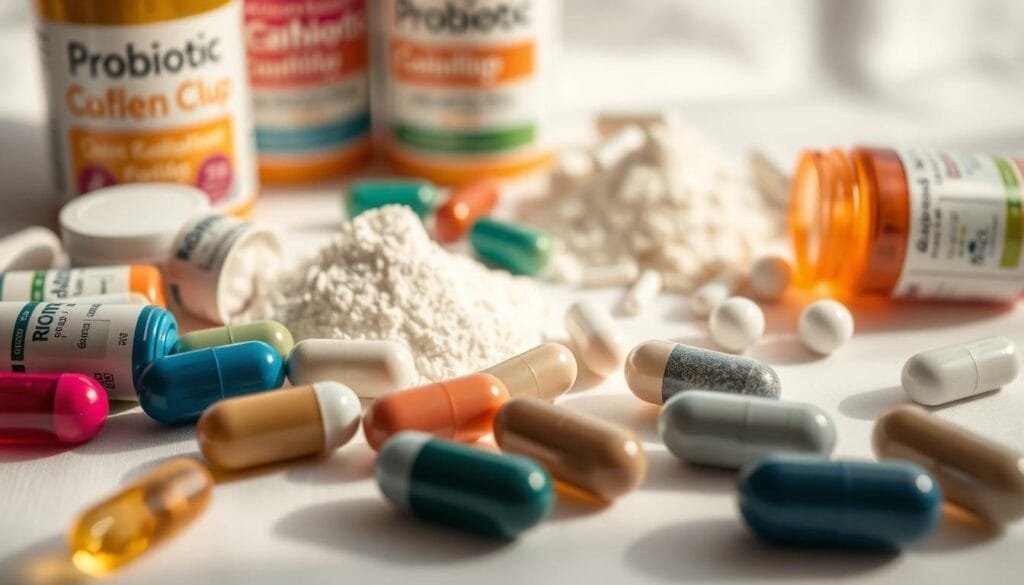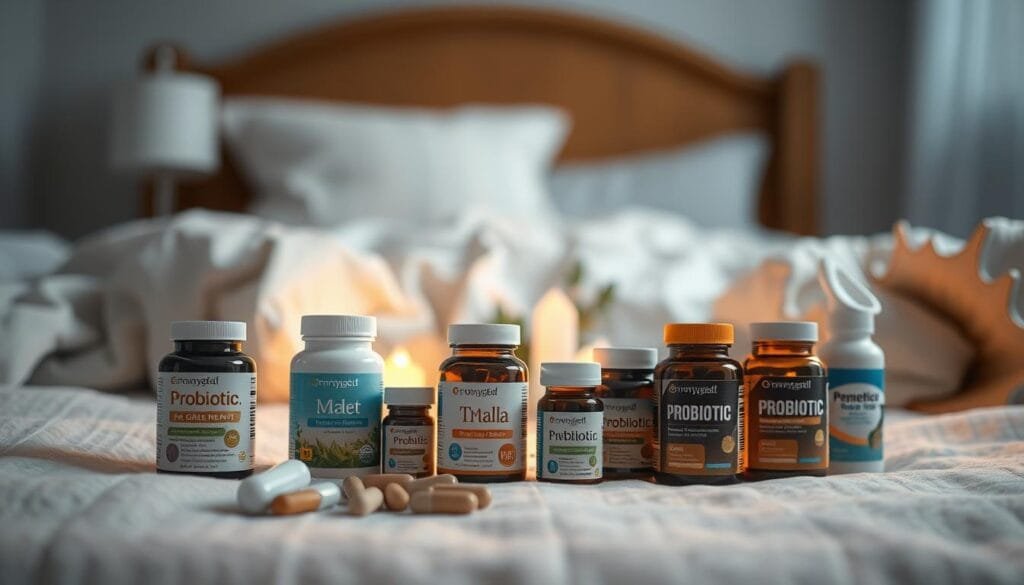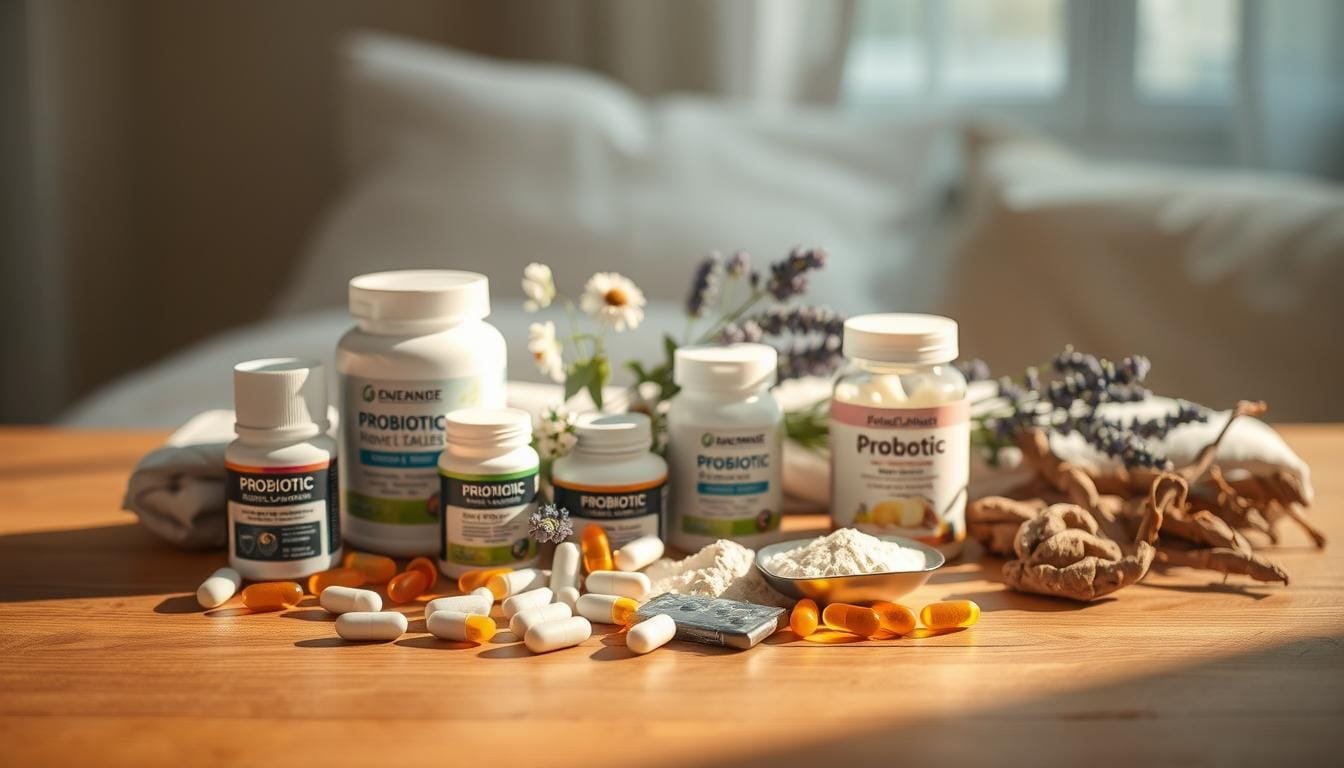Currently Empty: RM0.00
Many people struggle with restless nights, unaware that their gut might hold clues to better sleep. Research reveals a fascinating link between digestive wellness and rest quality, with certain beneficial bacteria playing a surprising role in regulating sleep patterns. These microorganisms, found in supplements and fermented foods, could help balance the body’s internal clock.
Emerging studies suggest specific strains may improve sleep duration and reduce nighttime awakenings. For example, Lactobacillus and Bifidobacterium species show potential in managing stress-related sleep disruptions. However, experts emphasize these findings are preliminary, and results can vary between individuals.
Nearly half of adults report daytime fatigue multiple times weekly, driving interest in natural solutions. While probiotics aren’t a cure-all, they may complement other sleep-friendly habits like consistent bedtimes and reduced screen exposure. Quality matters—look for products with clinically studied strains and proper CFU counts.
Key Takeaways
- Gut health influences sleep cycles through the gut-brain axis
- Specific bacterial strains may aid relaxation and sleep quality
- Probiotics work best alongside lifestyle adjustments
- Clinical evidence remains limited but growing
- Choose supplements with research-backed formulations
Understanding the Connection Between Probiotics and Sleep
Your gut does more than digest food—it might be whispering secrets to your brain about when to sleep. Trillions of microbes in the digestive system form a complex ecosystem called the gut microbiome. This living community influences everything from immunity to mood—and growing evidence suggests it helps regulate rest cycles too.
The Role of the Gut Microbiome
Within the gut microbiome, certain bacteria produce substances that affect sleep quality. They help create melatonin, the hormone guiding your natural sleep-wake rhythm. Stress or antibiotics can disrupt this balance, potentially leading to restless nights.
Research reveals a two-way relationship: poor sleep alters microbiome composition, while imbalanced bacteria may worsen sleep issues. Shift workers often experience this cycle, with irregular schedules triggering dysbiosis—an overgrowth of harmful microbes.
How Circadian Rhythms Interact With Microbes
Your body’s internal clock doesn’t just control drowsiness—it coordinates microbe activity too. Different bacterial strains become active at specific times, influencing digestion and neurotransmitter production. Night owls might have distinct gut patterns compared to early risers.
Maintaining consistent meal times supports both circadian rhythms and microbiome health. A diverse mix of trillions of microorganisms appears crucial for sustaining balanced sleep functions. While probiotics aren’t magic sleep aids, they could help reset this delicate biological harmony.
What is the best probiotic for sleep?
The scientific spotlight now shines on specific bacterial strains that show promise for enhancing nightly recovery. Research reveals particular microorganisms interact with the body’s chemistry to potentially ease tension and support healthy sleep cycles.

Exploring Key Strains for Restful Nights
Lactobacillus plantarum emerges as a top contender, with studies suggesting it may deepen restorative sleep phases while boosting daytime alertness. This strain appears particularly effective for those experiencing fatigue from poor rest.
Another noteworthy option, Lactobacillus gasseri, demonstrates consistent results across multiple trials. Participants reported fewer nighttime disturbances and improved sleep continuity when using supplements containing this strain.
Bifidobacterium longum stands out for its dual action—clinical trials link it to both better sleep quality and reduced anxiety levels. This makes it particularly valuable for individuals whose rest suffers from stress-related factors.
Combination formulas often deliver superior results. A 2021 study combining Lactobacillus reuteri NK33 and Bifidobacterium adolescentis NK98 showed:
- 62% reduction in sleep disturbances
- Improved stress response markers
- Faster sleep onset in 78% of participants
When selecting products, prioritize those listing full strain names like Lactobacillus acidophilus Rosell-52 or Bifidobacterium longum Rosell-175. These clinically validated options offer more predictable results than generic blends. For deeper insights into specific strains of probiotics and their unique benefits, consult trusted resources.
Experts recommend starting with lower CFU counts (5-10 billion) and gradually increasing as needed. Always pair microbial supplements with consistent sleep routines for optimal results—the true power lies in this combined approach.
Scientific Research and Evidence on Probiotics for Sleep
Groundbreaking studies reveal how microbial allies might transform nighttime rest. Clinical trials now offer measurable proof that specific strains can enhance sleep quality through gut-brain communication.
Insights from Clinical Studies
A 2009 investigation changed our understanding of microbial support. Elderly participants consuming Lactobacillus acidophilus Rosell-52 for three weeks saw sleep improvements through both wearable trackers and self-reports. Their rest became deeper and more consistent.
Twelve years later, a larger trial with 156 people confirmed broader benefits. Those taking probiotics reported fewer anxiety symptoms within four weeks and reduced depression markers by week eight. Sleep disturbances dropped as stress levels improved.
Linking Probiotic Use to Sleep Quality Improvements
These studies highlight two crucial patterns. First, benefits grow with continued use—the gut microbiome needs time to rebalance. Second, probiotics address root causes like stress rather than just masking symptoms.
Researchers note that effects appear most pronounced in older adults and those with existing sleep challenges. While results excite scientists, they caution that larger trials must confirm these findings before official recommendations emerge.
The evidence paints a hopeful picture: targeted microbial support could help millions achieve more restorative nights naturally.
How Probiotic Supplements Can Enhance Sleep Quality
Tiny microbes in your digestive system could be the unexpected key to unlocking better sleep. Through intricate chemical conversations with the brain, these microorganisms help regulate biological processes essential for restful nights.

Nature’s Biochemical Engineers
Probiotic supplements act as microbial reinforcements, restoring balance to the gut ecosystem. This rebalancing triggers increased production of serotonin—a mood-stabilizing neurotransmitter that converts into melatonin after dark. Studies show optimized serotonin levels may help people fall asleep 15% faster on average.
These beneficial bacteria also combat stress-related sleep disruptions by lowering cortisol levels. A calmer nervous system allows for deeper, more restorative sleep cycles. Simultaneously, they reduce inflammation that might otherwise interfere with nightly recovery processes.
Realistic Expectations Matter
While many users report improved sleep within 4-6 weeks, temporary bloating or gas often occurs initially. “These mild effects usually signal your gut microbiome is adapting,” notes a gastroenterology researcher. “Consistency is crucial—it takes time for new microbial communities to establish.”
Though generally safe, probiotic supplements aren’t suitable for everyone. Those with immune conditions should consult healthcare providers first. Unlike prescription sleep aids, these microbial solutions work gradually to support the body’s natural rhythms without dependency risks.
Choosing the Right Probiotic: A Buyer’s Guide
Navigating the supplement aisle requires smart strategies to find effective microbial support. Quality matters more than flashy packaging—here’s how to spot formulas that deliver real results.
Understanding Colony-Forming Units and Strains
Colony-forming units (CFUs) reveal how many live bacteria reach your gut. While 1 billion CFUs serve as a baseline, many probiotic supplements for sleep contain 10-50 billion for enhanced effectiveness. Higher counts don’t always mean better results—balance matters.
Look for specific strains like Lactobacillus rhamnosus GG or Bifidobacterium breve. These have documented sleep benefits in clinical trials. Avoid products listing only genera without strain details—they often lack scientific validation.
Tips for Evaluating Supplement Quality
Storage conditions make or break a product’s potency. Refrigeration preserves delicate bacteria, though some shelf-stable options use protective encapsulation. Check expiration dates—viable CFUs decrease by 10-20% monthly in subpar conditions.
Third-party certifications like NSF International or USP verify label accuracy. Reputable brands disclose testing results and manufacturing practices. “Transparency separates premium supplements from questionable ones,” notes a nutrition researcher.
Always consult a doctor before taking probiotic supplements, especially if managing health conditions. Pair microbial support with sleep hygiene practices for cumulative benefits over time.
Probiotics vs. Prebiotics for a Restful
While probiotics grab headlines, their lesser-known partners play a crucial role in sleep support. Prebiotics—specialized fibers that feed beneficial gut bacteria—work behind the scenes to maintain microbial balance. Unlike live cultures in probiotic supplements, these indigestible compounds come from foods like garlic, onions, and oats.
The gut-brain axis thrives when both elements work together. Studies show combining specific probiotic strains with prebiotic fibers enhances their effectiveness for nightly recovery. This synergy helps produce more sleep-regulating compounds like GABA and serotonin.
For those seeking natural solutions, consider adding prebiotic-rich choices:
- Chicory root in morning beverages
- Fermented foods like tempeh or kimchi
- Local Malaysian fruits like bananas and mangosteen
Timing matters—some find prebiotic foods digest better earlier in the day. While probiotics directly introduce helpful microbes, prebiotics help existing ones flourish. Together, they create an optimal environment for restorative sleep without morning grogginess.
FAQ
How do gut bacteria influence sleep quality?
The gut microbiome produces neurotransmitters like serotonin and GABA, which regulate sleep cycles. Imbalances in beneficial bacteria may disrupt rest by affecting stress responses or inflammation linked to poor sleep.
Which probiotic strains are linked to improved sleep?
Strains such as Lactobacillus helveticus and Bifidobacterium longum show promise for reducing stress hormones and inflammation. These microbes may support relaxation and deeper sleep stages by balancing gut-brain communication.
Can prebiotics enhance the effects of probiotics for sleep?
Yes. Prebiotics like inulin or fructooligosaccharides feed beneficial bacteria, amplifying their benefits. Pairing probiotic supplements with prebiotic-rich foods—such as garlic, bananas, or oats—can strengthen gut health and sleep outcomes.
What should one look for in a sleep-supporting probiotic supplement?
Opt for products with clinically studied strains, 10–20 billion CFUs, and third-party testing for purity. Avoid additives or unnecessary fillers, and check expiration dates to ensure live bacteria viability.
How does the gut-brain axis affect sleep patterns?
The gut and brain communicate via the vagus nerve and neurotransmitters. A balanced microbiome helps regulate cortisol levels and melatonin production, which are critical for maintaining healthy circadian rhythms and reducing nighttime restlessness.
Are there dietary changes that complement probiotic use for sleep?
A fiber-rich diet with fermented foods like yogurt or kimchi supports microbial diversity. Limiting processed sugars and alcohol can also reduce inflammation, creating a better environment for both gut health and restorative sleep.
What does current research say about probiotics and sleep disorders?
Studies suggest certain strains improve sleep duration and reduce interruptions. However, evidence varies, and more long-term trials are needed to confirm specific benefits for conditions like insomnia or sleep apnea.
How long does it take for probiotics to impact sleep?
Effects vary by individual. Some notice subtle changes in digestion or stress within weeks, which may indirectly improve sleep. Consistency is key—daily use for 6–8 weeks allows strains to colonize and exert lasting benefits.


